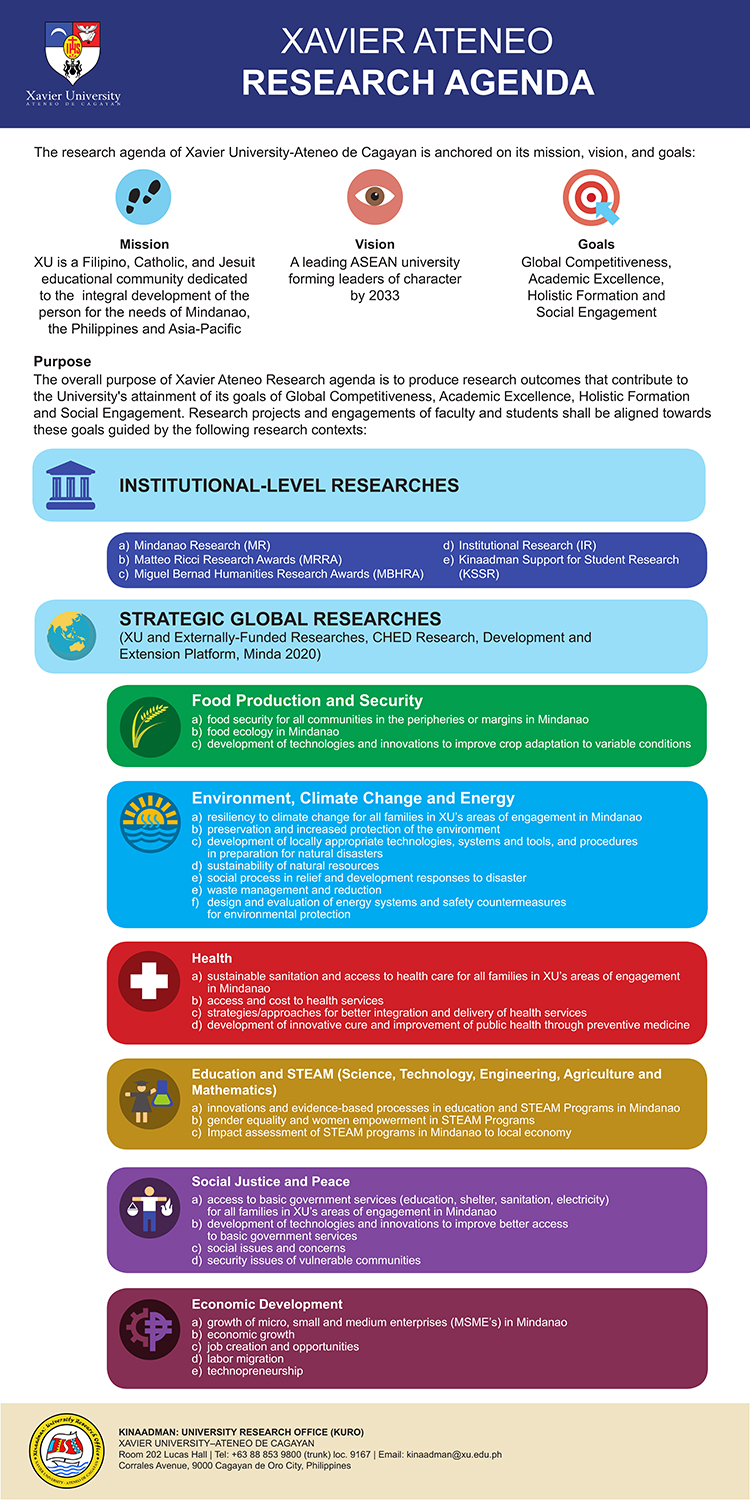XU University Development Goals (XU-UDG)
Stronger Formation - The general goal is to improve the academic and non-academic programs for the formation of persons as indicated in the XU mission statement
- Produce Level III, IV programs and COD, COE’s.
- Improve student performance in board exams and job placement.
- Improve IT and communication skills.
- Develop administrative, management, and leadership skills.
- Develop work-related productivity skills (competence).
- Form persons imbued with Christian values and conscience.
- Cultivate and deepen commitment to serve God and others.
Greater Societal Engagement - The general goal is to produce research outcomes (e.g. products and services) that advance peace and social development in Mindanao Thematic Agenda
Thematic Agenda
- Food Security – Mindanao largely remains poor and hungry despite its wealth of resources; the University will ensure access to food for all families in its areas of engagement in Mindanao through empowerment of farming and fishing communities
- Health - Water and sanitation are prerequisites for health and are globally recognized as necessary in reducing poverty and promoting sustainable development; XU will help improve public health through preventive medicine and sustainable sanitation
- Environment - The preservation and increased protection of the environment is imperative in this time of evident and felt climate change effects in Mindanao and in Cagayan de Oro; Xavier University will ensure environmental integrity through landscape management, resiliency to climate change, and reduction of waste
- Governance – Engagement in governance is deemed strategic to help influence and enforce local public policies that provide the foundation for the effective and sustainable implementation of development initiatives and programs in the communities; XU will strengthen good governance and responsible citizenship through research-based outputs
- Peace – Peace remains a desired state in the island of Mindanao. With the challenges to peace in many fronts, XU will facilitate the cultivation of a culture of peace by strengthening peace-building initiatives, primarily by developing the University as a hub and common ground for dialogue and resolution/transformation of conflicts, and development of peace champions within and outside the university.
Better Administration - The general goal is to improve support of the operations of the University in view of its core mission
- Develop a more responsive organizational culture or climate
- Integrate XU information systems.
- Improve financial sustainability.
- Upgrade physical and information infrastructure.
- Develop new campuses and other landholdings.
National Higher Education Research Agenda (NHERA 2)
Social Sciences
| Major Issues | Priority Research Areas | Suggested Approach |
| Families and Communities Transition | Drivers, processes and consequences of: Community transitions, labor migration, changing family structure Evolution of social institutions in response to changes in family and community structures | Descriptive research;cross-section trend research; panel/longitudinal research; |
| Education | Alignment of human capital development goals in school, in communities, and Philippine society; social processes and factors that shape educational policies and processes at national, community, school and individual levels; efficacy of educational process (instructional, management, policy, etc.) in the development of human capital; Social processes and dimensions of educational reforms and educational institutions | Descriptive research (including GIS mapping); cross-section trend research; panel/longitudinal research; historical research; evaluation of programs and policies; theory and model building |
| Disaster | Social antecedents of disaster; social determinants of vulnerability to disaster; social response (community and national levels) to disaster mitigation and adaptation; social process in relief and development responses to disaster; short-term and long-term consequences on well-being of individual and communities in disaster-stricken and/or vulnerable areas | Descriptive research (including GIS mapping); cross-section trend research; panel/longitudinal research; historical research; |
| ICT and social change | Description and analysis of changes in social institutions such as education, governance, church/religious organizations, financial and agricultural institution, etc.; social dimensions of adoption and utilization of ICT in individuals, organizations, and communities, social analysis of virtual communities and interactions | Descriptive research (including GIS mapping); cross-section trend research; panel/longitudinal research; historical research; evaluation of programs and policies; theory and model building |
Natural Sciences
| Major Issues | Priority Research Areas | Suggested Approach |
| Climate Change | Physical oceanography; marine coastal geology; engineering geology; volcanology; hydrology; seismology; vulnerability of biodiversity | Scenario building |
| Pollution | Persistent organic pollutants, heavy metals, mariculture-derived pollution, vulnerability of biodiversity (priority research sites: Mindanao Sea, Bohol Sea, Southern Palawan Sea, Northern Luzon Sea, Sulawesi Sea, Sulu Sea, Straits); instrumentation (detection, analysis, robotics, atmospheric/environmental); materials science (electronics applications, catalysts, environmental remediation); nanotechnology | Multidisciplinary approach to measurement and mitigation; Programmatic approach on carrying capacity of ecosystems |
| Conservation | Systems biology (modelling, bioinformatics, ecology, pollution, community, ecosystems); genetics (molecular, population, evolution); biodiversity (Mindanao Sea, Bohol Sea, Southern Palawan Sea, Northern Luzon Sea, Sulawesi Sea, Sulu Sea, Straits); 3-domain scheme (morphoanatomy, physiology, and behaviour); instrumentation (atmospheric/environmental) | Baseline Study; Ecosystem-based studies |
| Energy | Intelligent systems; molecular simulation/modelling; materials science (alternative energy, electronic applications, catalysts, environmental remediation); natural products (biofuels); materials research (energy, fuel cells, nanomaterials, ICT/microelectronics, functional materials); greener technologies fro minerals, coal, geothermal, petroleum; | Development of clean technology; Exploration of alternative energy sources |
| Health | Bioassays; diagnostics; drug/cure discovery; biosensors; natural products (pharmaceuticals, cosmeceuticals, nutraceuticals, pesticides); instrumentation (detection, analysis, robotics, medical physics) | Rapid assessment; Development of innovative cure |
| Food | Natural products; biochemistry; molecular biology | Exploration of new resources and more efficient production |
Mindanao 2020: Peace and Development Framework Plan (for 2011-2030)
Research & Policy Agenda Themes
| Themes | Priority Research Area |
| Economic Development |
|
| Climate Change Adaptation and Mitigation | Assessment on measuring the risk of Mindanao provinces to climate change and disaster
Estimating the economic and social contribution of the mineral industry in Mindanao
Sustainability of Fisheries and Aquatic Resources
|
| Human Development and Poverty Reduction |
|
| Good Governance and Anti-corruption |
|
| Security, Justice and Peace |
|
